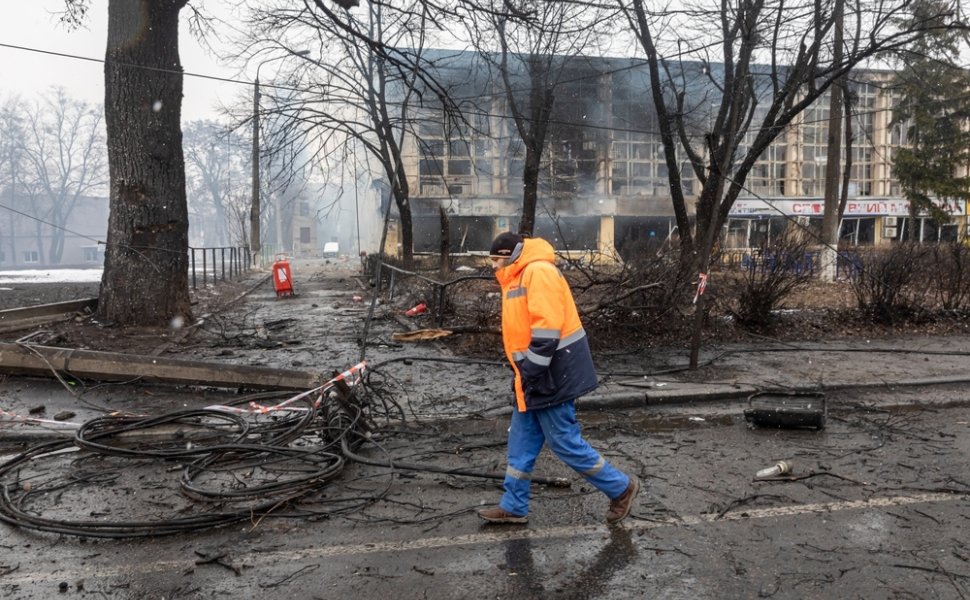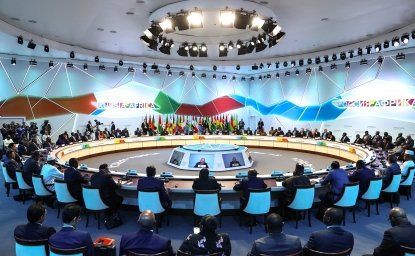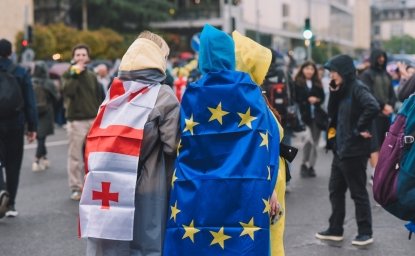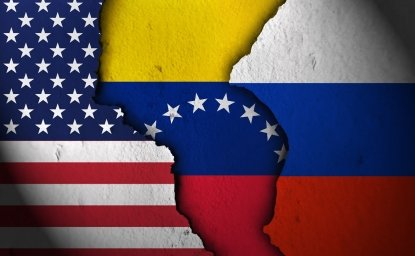The transcript has been lightly edited for clarity.
Izabella Tabarovsky: From the Kennan Institute, this is Izabella Tabarovsky, and you are listening to The Russia File.
Russia’s wartime violence towards Ukrainian civilians has been shocking. My guests today point out that it also has been multidimensional, driven by a complex mix of ideological, conceptual, contextual, structural, and cultural factors. They argue that it has been driven by an intentional, top-down policy of terror, as well as by a set of ad hoc grassroots factors.
This raises crucial questions. Did the Russian military intend to apply such a level of brutality to Ukrainian civilians? If not, how did this approach become so widespread so quickly in the war? What role did Russia’s early operational and tactical failures play in enabling this level of violence against Ukrainian civilians?
To help me answer these questions today are two Israeli analysts, Dr. Sarah-Masha Fainberg and Lieutenant Colonel (retired) Daniel Rakov. They are both senior researchers at the Elrom Center for Air and Space Studies at Tel Aviv University.
Dr. Sarah-Masha Fainberg focuses on Russian and Chinese policy in the MENA region. She is also an adjunct professor of Israeli affairs at Georgetown University in Washington, DC. Lieutenant Colonel (ret.) Daniel Rakov is an expert on Russian policy in the Middle East and the Great Power competition in the region. He served in the IDF for over 20 years, mainly in the Israeli Defense Intelligence
Hello, and welcome to the program.
Daniel Rakov: Hello, Izabella. Thank you for having us here.
IT: I want to start out by quoting from a paper that, Sarah, you wrote with your colleague Céline Marangé. You write: “The invasion of Ukraine was conceived and prepared as a large-scale repetition of the 2014 annexation of Crimea. It was supposed to illustrate the Russian Army’s ability to conduct a ‘contactless,’ surgical, swift, and complex military operation. In the initial operational plan, collateral damage was to remain limited. Avoiding civilian casualties and limiting the destruction of civilian objects were seen as two of the cornerstones of the operation’s success. The objective was to create favorable conditions for Ukrainian civilians so as to contain their potential resistance. Meanwhile, most critical national infrastructure was to be preserved to facilitate the establishment of a pro-Russian regime following the overthrow of President Zelensky, who was expected to flee the country or be liquidated.” End of quote.
It’s striking to read this assessment today. We all know that the original Russian plan for the conquest of Ukraine didn’t work out. But you add an important dimension.
You say that Russia actually did think about encounters with civilians. It planned an operation that would minimize civilian casualties. Yet not only did it not become this kind of contained operation, Russian troops began to commit war crimes virtually from the beginning.
And this raises all kinds of questions about what enabled that, and I'm hoping that this is what we will discuss today: the factors that enabled the violence in Ukraine vis-à-vis Ukrainian civilians.
So maybe we start by talking a little bit about what constitutes a war crime. What is a war crime?
Sarah-Masha Fainberg: Basically, Izabella, war crimes are listed in Article VIII of the Rome Statute. They do include violations of the laws and customs of war, grave breaches of the Geneva Conventions and its first additional protocol, and other particularly serious violations of the law of armed conflicts. So basically, according to this definition, Russia has conducted a wide array of war crimes towards civilians that we divided into four main categories.
The first category includes indiscriminate killings, physical and sexual violence. And it's important for me to underline the sexual violence aspect, as the Russians have used rape as an instrument of war, along with robbery and looting. And the most famous example of this type of crime is, of course, the Bucha massacre that was discovered and documented in April 2022.
The second category of war crime includes the material damage that has directly affected civilians. And it does include two types of damages. First of all, the collateral damage, meaning the non-intentional destruction that derives from the Russian Army's deficiencies and its inability to apply the reconnaissance and strike complex, meaning conducting high-precision strikes based on real-time intelligence.
The second category is the deliberate attacks on civilians and on the CNI, the critical national infrastructure. This second type of war crime started in the fall 2022, when the Russians shifted their strategy towards a deliberate targeting of civilian objects. I mean, a massive deliberate targeting of civilian objects.
The third category is the de facto institutionalized violence targeting civilians and prisoners of war in Russian-occupied territories. You know, we've seen, Izabella, a strange mix of Soviet-time practices and post-Soviet practices in terms of the violent techniques used against civilians and prisoners of war in those occupied territories. The Russians established filtration camps that were very well documented and practiced bodily violence against civilians and prisoners of war alike, including, of course, mental and psychological violence that was used. For example, the reeducation sessions applied to detainees that were deemed disloyal.
And finally, a fourth category of violence that is often labeled in academic literature as the strategically engineered migration,…the leverage of the migratory cause that was triggered by the war as an instrument of war against the civilians, against the political leadership, and against the Western power. And this is an element that Daniel can speak to later, because this is part of the Russian way of thinking about civilians as a pressure point in the battlefield.
IT: Well, and the numbers in each of the category of crimes are just staggering. You mentioned some 20,000 buildings and 120,000 houses were destroyed, 238 cultural sites, some 20,000 Ukrainians held as prisoners. And also, of course, the deportation of children: 16,000 children forcibly deported to Russia. It's a de facto child abduction policy.
SMF: Right. First of all, to the numbers, it's very difficult to establish. When we did this research and when Daniel and I also wrote a report on this, it's very difficult to come up with accurate numbers regarding the number of casualties, regarding, for example, the number of rapes. I'm coming back to this issue; for example, I interviewed the Ukrainian sociologist Marta Havryshko.
She's a specialist on sexual violence used against Jewish women in World War II in Ukraine. And for example, according to the procurator general of Ukraine, only 155 cases were reported. But she assesses that thousands of rapes were done across Ukraine against women, against children, against men also. So it is very difficult to come up with good numbers.
But in terms of your second point, when we talk about the institutionalization, the whole issue that we are having and that we researched with Daniel and Céline Marangé, is the difficult…the confusion or the balancing between intentionality and inevitability. When we talk about those war crimes, to what extent were they intentional, were they deliberate, were they prepared antebellum, before the war, and to what extent do they belong to the wartime, to the in bello cause and improvisation and adaptation and downward spiral into violence that belongs to every conflict dynamics?
Another question to you that is important to raise is to what extent those war crimes belong to a specific Russian culture of warfare. If we inscribe those war crimes that were perpetrated in Ukraine in the longer historical trajectory of war crimes perpetrated during World War II…we all remember the mass rapes perpetrated by the Red Army soldiers at the end of World War Two. We all remember the, I would say, the genocidal aspects of the First Chechen War and the Second Chechen War. So does it belong to a specific Russian culture or is it a feature of any battlefield? This is an important point to raise.
IT: Well, and why don't we return to this point later on? I want us to go through some of the factors that you both discussed as having contributed to catalyzing violence by Russian troops vis-à-vis Ukrainian civilians. So one of the first points is Russia's toxic informational warfare. How has that enabled violence?
SMF: Well, I would say that this is the matrix of war violence in Ukraine. It's a national warfare against Ukrainians [that], I would say, started in the late 19th century. This old culture of contempt for Ukraine as a nation, as a culture, framing Ukraine as a Malorussia, “little Russia.” So there is a long imperial tradition of contempt and of this idea of a cultural, imperial subjugation of Ukraine.
Add to this, since, I would say, 2008 (2004 and 2005, I'm sorry, the Orange Revolution) an incremental culture of contempt and violence that was cultivated in the Russian information space and that was increased since 2014. In fact, since 2014, Russia and Ukraine are at war. And you have a full space that cultivates and legitimizes a culture of violence against Ukraine and Ukrainian civilians. This is a very important aspect of the downward spiral into violence. Russia created a very fertile ground for the preparation of war time, violence. And once the war started, all the elements were there to cultivate and to legitimize this violence.
Another important element to raise is that the war evolved very rapidly. During the first phase of the war, I would say the first months before the war and the first month after the war, in Russian official propaganda there was this idea that all efforts were made to preserve civilian lives. Then the Russian establishment turned to Ukrainian civilians, telling them that nothing will happen to them should they accept the Russian invasion. But very rapidly, since March and April, there was a transition to exterminatory rhetoric that went hand in hand with nuclear rhetoric and this kind of Christian Orthodox justification of evil and murder, going as far as to reframe the Ukrainians and the Ukrainian nation as the Antichrist, such as the West.
IT: Yeah. And sort of the talk about the holy existential war on Russia's part, the sacralization of violence. And then, of course, the dehumanization and demonization of Ukrainians. And I think, Daniel, you wanted to add something.
DR: This is something which is more universal. One of the precursors of violence against the civilians is the demonization of the civilians. And before the Russians, there was a problem. On the one hand, at the beginning they tried to portray the Ukrainians as brother[s in a] brotherly nation. On the other hand, the Ukrainian nationalists, the Banderovtsy, they are sick, and nothing [will] cure them quickly, [unless] they…pass [through] a long process of deukrainization. So the information warfare was aimed at the Russian soldiers and the Russian population to convince them that the other side is evil.
So every Ukrainian that Russian soldiers would encounter at a checkpoint, they are potentially Ukrainian nationalists, Ukrainian Nazis, and you know how the Russians treat Nazis: the Nazis should be killed. So this portrayal of the Ukrainians as the Nazis, this is something which accelerates the potential for the civilians to be hurt, because they are not human, because potentially they are the most evil person possibly to exist.
IT: Right. Well, and interesting that something else that you discuss also is the shifts in that, at some point, I think toward the fall of 2022, Russian propaganda begins to shift the blame onto Ukrainians, claiming that massacres such as the Bucha massacre was staged, and that somehow everything that Russia is doing is actually Ukrainians’ fault. They are actually doing that.
DR: I think it's a continuous phenomenon. I'm not sure that is something that they changed. You can see it from day one of the war [that] there are mirror narratives of Russia. Everything bad is put on the Ukrainian Army and everything which the Russian Army is being ashamed of, the Russian propaganda machine says the Ukrainians do it, whether they're civilians or the military. If there is a picture or an image or video, it is portrayed as fake news or some false [flag] attempt by the Ukrainians.
SMF: And I would add to this that, combined with the denial of war crimes and the attribution of the guilt to the adversary, there is this soft, subtle glorification of the perpetrators of war crimes. We all remember that on April 18th, 2022, President Putin decorated the soldiers of the 64th motorized rifle brigade, whose responsibility in the Bucha massacre was documented, very well documented.
So it sent subtly, but strongly, a message to the Russian public…a message that those crimes…it is between a routinization of violence—“на войне как на войне,” this is war and this is what it is all about—and this kind of cynical justification of this violence. And the fact that it’s shown on Russian television, this is discussed on Russian television, it sends that kind of message.
IT: Let’s talk about the next factor that has enabled the violence, which is—you call it doctrinal causes, related to the instrumentalization of civilians on the battlefield. And that relates to contemporary Russian military thought. So I'm wondering, can you elaborate on that? What is the Russian military thought in this regard?
DR: But maybe this is a good point to say why did we start to deal with this issue? Because our research center, the Elrom Center for Air and Space Studies at Tel Aviv University, is a joint venture of the university and the Israeli Air Force, so we have a connection to the Israeli Air Force. And when the war started, we thought, “what could we learn from this war for the Israeli Air Force?” And at the beginning it seemed that the Russians tried to avoid hurting civilians, and one of the issues was maybe the Israeli Air Force or Israeli Army [can] learn something from the Russians on this issue. And I must say, as somebody who served more than 20 years, one of the main issues we are dealing with when conflicts were on is how the Israeli Army will prevent and minimize civilian casualties. And when being trained as a junior soldier, we were dealing with this: we were dealing with the moral issues, we're dealing with, “what concrete steps should the junior soldier, or any soldier, [take] to prevent civilian casualties?” And the Israeli Army is in constant friction with civilians, so this is an issue.
So when we started to look into this topic, we went to the Russian military [regulations to see] how do they train their soldiers? We looked at the regulations of the Russian military academies, the learning materials, the standing regulations of the Russian ground army. Even we were looking into several books that were published at the beginning of the war: some guide of the Afghanistan veterans and a guide for political officers. And we looked [at], “how do they treat this issue of civilians at war?” And we didn't find anything but very, very general passages that were written in a 200-page manual [that]… the soldier should know the Geneva Convention paragraphs and that's it. And in some of the materials, even, there was a possibility to try to evade the moral issues.
For instance, there was a manual for the orthodox priest. So how should he treat this issue? So there was a way to get away from the moral dilemma. So on the grassroots level, the Russian Army didn't really deal with this issue. We looked at Voyennaya Mysl [Military Thought], the leading military journal, and looked [at] whether the Russians deal with this issue of minimizing civilian casualties, and also we didn't find any sign of dealing with this topic. For instance, there was an article for some 50 pages dealing with, “how should you conquer a population center?” And they were speaking about the urban [plan] and how to conquer a small city, and they were speaking only about the infrastructure, not about people, which was strange. And then…we tried to compare the Israeli Army. So in the Israeli Army, there is a doctrine and there are weapon systems that are meant to diminish the casualties, so the weapon systems are precise, and you know how to target your enemy, so the targeting is precise. And if you see the civilians, you try not to hurt them. So you minimize the possible level…the uses of what is called statistic kinetic weapons, which you cannot target precisely.
The Russian Army is quite the opposite: when they enter this war, despite many years of dealing with precise weapons, their precise weapons are not operational. So the main efforts they have, the main tool, are the dumb bombs or rockets [that] are not precise, and that leads to a lot of casualties.
Another issue is that the Russian Army is an artillery army. So the idea is to try to manage a contactless war, so you don't see the civilians, you don't see your enemy. And this is easier to launch rockets without seeing eye to eye [the] civilian population. But what really happened, because of the way this operation was planned from the first moment, [was] they had to see the Ukrainian civilians and to face them, so the army was dealing with something it was not trained to do. The soldiers didn't know how to deal with civilians. And nothing worked, and the generals from around them were pressuring them to deliver results.
So this lack of tools that would help the army to refrain from hurting civilians brought the army to [a point of] let[ting] a lot of collateral damage [happen]. And another question we were asking…so it's not like Russian military academies say, “please [feel free to] rape, please [feel free to] steal, please [feel free to] kill civilians.” I suppose if we were present [at] the military training, they would look like nice guys. But I think the problem is that there is an atmosphere, as mentioned previously, à la guerre comme à la guerre, war is war, and we've seen it also happening in previous Russian war engagements—it's a lot of tolerance of stealing, of killing. Many times, the least elite Russian troops found themselves confronting the civilian population. Poor people without good education, they were pressured from above to bring results. And I think that this pressure from above, lack of tools, nothing working—all of this brings the inevitability of war crimes.
SMF: I would like, Izabella, to follow up on Daniel's point, about the tension between inevitability and intentionality and to highlight—this is a point that we develop extensively in our research that we published, Daniel Rakov and I, about the instrumental approach of the new-generation warfare, the Russian military concepts towards civilians.
What…we mean by an instrumental approach is that civilians in Russian military thinking are viewed as a [means of] leverage of integral systemic multidimensional pressure on the enemy system through informational, psychological, political, economic, and yes, military instruments. And that is not specific to Russian military thinking. Western doctrines can have, to a certain extent, a sort of instrumental approach to civilians, [to] try to put pressure on civilians to shape the decision-making of the political and military leadership of the adversary country. But what is specific to the Russian thinking is…the integral approach, pressuring civilians before a conflict…and Ukrainian civilians have been pressured for eight years, through informational attacks (cyberattacks, of course), which belong to the informational warfare in Russian doctrine, through economic pressure. So this is an important point to make, that in this war in Ukraine, the fact that civilians have been viewed primarily as an instrument of pressure against Zelensky, against the military command, against the West, has operated as a key factor, a key catalyzer, a key amplifier of violence.
Another specificity that needs to be highlighted…Daniel Rakov conducted an extensive study about Russian military writings. And we have to say that civilian rights—and it's not a surprise—are just marginally mentioned. This is very negligible. The discussion of civilian rights on the battlefield is almost absent in Russian military writings.
IT: Well, and I think you also talk about the fact that the Russian armed forces lack a prosecution mechanism for war crimes. Soldiers are neither sanctioned nor judged before a military tribunal for that type of an infraction. And it’s almost like the incentive system is set up in such a way that soldiers are not incentivized to avoid the mistreatment of civilians. Soldiers are more motivated to worry about self-preservation than protecting civilians on the battlefield.
DR: I think that the system exists, but it is not used in a proper way. So I think it's very similar to what's going on with the civilian rights in Russia. So if you open the Russian Constitution, it's all about caring about the rights of the Russian citizens. But being a Russian citizen doesn't feel this way. And I think in the army, it is the same, so if you try to question the orders of your commander, you might get punished. If you demand your rights as a soldier, you could get punished, but for the issue of hurting civilians—[it’s] okay, it happens. You steal something—it happens. You look at your officers; many times your officers do the same. So if your commanding officer steals or kills somebody, it's a bad example for the soldiers, and who will complain? And I think we've seen many times that on the individual level there are units which have higher moral standards, and they try to keep those. But when it is left for the decision of a junior commander, and the system doesn't deal with it seriously, there is no persecution and the opposite is happening.
SMF: Yeah, and add to this the fact that the Russian Army doesn't have a body of senior noncommissioned officers, the NCOs. So it means that there is a lack of supervision, there is a lack of transmission of orders, and that also acts as a catalyzer potentially of violence on the ground.
I would like to come back also to this idea of blurred moral boundaries, this combination between serious punishment for minor offenses and impunity for grave crimes.
I think this was amplified by the importation into the battlefield of paramilitary units. I think this is a feature of the Russian Army and of the Soviet Army, by the way. So this is a long tradition.
DR: And the Tsarist Army, and the Imperial Army.
SMF: Exactly. Exactly. But it was amplified by the Kadyrovtsy and the Wagnerovtsy, and this importation of the specific violent culture of Kadyrov and the specific violent culture of Prigozhin, and the importation of the ZEK culture—the culture of prison. It reminds me of the shtrafbats of World War II—of those soldiers who were coming from penal colonies and asking for some kind of whitening, a whitewashing their [past crimes] through serving in the army and committing crimes.
And I think there is a dual movement of brutalization. On the one hand, there is the Russian prison culture that does amplify war crimes in Ukraine on the battlefield. And on the other hand, you have the Ukrainian experience and the multiplication of war crimes that do export violence into Russian society. I always think that when this war is over, we will have a Russian society that is reshaped by the paramilitarization of society, and by the acceptance and the experience of war violence. You will have traumatized veterans [who] will import with them another type of violence into Russian society itself.
So in other words, Russian war crimes have triggered a brutalization on the ground in Ukraine, but also a deep-seated and potentially long-term brutalization of Russian society itself.
DR: And if we look at especially at the Wagner phenomenon, when you take convicts into war and you say, “no matter how dire the crimes that you've committed before, you will serve six months for your country and everything will be forgiven, you are going to get some extra privileges of a veteran and medical treatment and etc.,” so the message is that the highest merit is to serve those six months for the country, no matter how you pass the time during this service. And if people were sitting in jail for crimes they committed and they were forgiven, so I think it's natural that they will try to commit further crimes and [for this] ZEK culture to diffuse to uncorrupted soldiers, to sort of regular citizens.
IT: So the next factor that you talk about (and I think we already touched on some of the specifics in it), but the next factor is the conducive context: war violence as a consequence of successive fiascos. So basically, the military fiasco of the first two weeks and the sheer unpreparedness of Russian troops contributed, opened the door to, the brutalization of Ukrainian civilians.
SMF: Right, actually, paradoxically speaking, even though the Ukrainians make the argument that Russia is deliberately committing a genocide, there was no intention at the beginning to harm civilians. On the contrary. But basically, the war crimes stemmed not from the success of the operational plan, but from its very failure. And as Daniel previously mentioned, you had war crimes from the very first hours of the invasion just because of the fact that mentally and logistically unprepared soldiers found themselves in an intensive interaction with elderly women, with children, with young teenagers, and they were not prepared to manage…this interaction.
So that was the first downward spiral to this. The second element is due to the change of strategy of the Russian Army. When the initial plan failed, plan B or the alternative was to transition to the deliberate targeting of civilians. So if the contactless war doesn’t work, we will tap on the maximal pressure idea, the maximal pressure instruments. And this maximal pressure belongs to the Russian military concept, the idea that you can incrementally use pressure and calibrate it according to the stage of the conflict that you are in.
IT: Well, and then there is something that we also already touched upon, but I want us to talk a little bit specifically about another factor that enabled violence, which is the culture of punishment and impunity that we have in the Russian Army. And I think I have to return to the historical parallels that I think you've both made, that there is actually a lot of continuity with the Soviet Army, possibly even with the Russian Tsarist Army as well. Those of us who grew up in the USSR know the Soviet part of that history. There seem to be very clear parallels here with many of the things that you talked about from World War II to Stalin to later on the Brezhnev era. Do you view what's happening today as a kind of historical continuity with previous eras in the Russian military?
DR: I think it’s natural; it’s historical continuity. I think it's also [that] the army is an integral part of Russian society. On the Ukrainian battlefields besides the Russian Army, you currently meet the Rosgvardia and people from the FSB and different elite units from other military services, and now, because of the conscription and the enlistment of some volunteers, or semi volunteers—you see the wider Russia on this battlefield. The only criterion for the soldiers is whether they fulfill their military mission, and everything besides it is put aside. And I think that's very difficult also to deter the Russian military from committing war crimes, for instance, with the threat of some universal jurisdiction, military international codes, because the feeling is that we're in the big Russia, so nobody will judge us besides the Russian courts, and Russian courts are in the hands of Putin's regime. So if there is a dilemma, it is easy to deflect it. There are politruks, political officers in the units, that also explained that you are fighting the Nazis, so it's okay. As long as you fight the ultimate evil of the Nazis and the people who do not respect the Orthodox faith,…it is easier to explain the crimes committed....
SMF: I would add to what Daniel said; there is an element of continuity and a different element, an element of rupture. The element of continuity is what [Alexander] Cherkasov, from the Memorial human rights organization in Moscow, called the chain of impunity. I think that those war crimes are enabled ultimately by the chain of impunity of the Soviet crimes.
I would give you an example. The fact that the Holodomor—the assassination or mass murder, some would say genocide, by artificially induced famine that was committed against the Ukrainians and other ethnic groups in the 20th century—the fact that it wasn't recognized as a mass murder by Moscow against the Ukrainian people is some kind of subtext that does enable violence.
If in post-Soviet Russia…let's imagine, you and I, that there was a massive monument to the victims of the Holodomor in the center of Moscow, maybe it would have been some kind of moral pressure against that war, against those crimes. So there is the question of the chain of impunity and the lack of collective memory to work through the crimes that were committed that included the crimes committed against the Ukrainians as a nation.
And the element that is different and that we talk about extensively, with Daniel Rakov, in our research reports is the transparency of this war. I was listening today to Victor Shenderovich, who said that during World War II, you wouldn't have imagined, for example, a Polish Jew imagining that a person living in Berlin is seeing what is happening on the ground.
And the fact that this war is very transparent, the fact that the digital front is one of the central dynamics of this war, gives a different twist to those war crimes. They are documented. They are leveraged by the Zelensky government, and rightly so, to harness Western support. They are also transparent in many ways to the Russian public. I mean, not only via VPN—because it's just very hard to deny them—but there is a discourse, a very sophisticated discourse, that constantly justifies and tries to explain the dissonance between what is transparent on the modern battlefield, on the Ukrainian battlefield, and [how] you are supposed to make sense of it.
And I think this creates also a challenge to Moscow, and at the same time, an opportunity—an opportunity in the sense that this transparency and the digital space are used against the Ukrainians themselves to rally the Russian public, to track down saboteurs and traitors both inside Russia and in Ukraine. This is also a new element, a Chinese type element: the use of digital tools to rally an entire society behind the war effort, and to track down and identify potential enemies on the ground.
I mean, these tools were used, for example, in the filtration camps, taking the cell phones of Ukrainian civilians, prisoners of war, just to convert them into enemies. So this is also a new technique that differs from the Soviet and immediate post-Soviet periods.
IT: Well, so what conclusions can we draw from this? What do we learn from the research that you have conducted? Give us some big-picture lessons here.
DR: So we tried to look and decide, as we began, “what does the military have to learn as an attacker, as a defender, and how [can] a state act and what conclusions can be derived?” First of all, we should be humble and say that we are in the middle of the conflict, and we are in the middle of a disinformation effort by many sides. A lot of information is absent. So those are preliminary conclusions, we think. And also, one [other] precaution is [to] say that this a very special kind of a war. So it's a war of Russia and Ukraine; it doesn't resemble, many times, other wars. For Israel it doesn't resemble any war Israel was fighting. So we should be also be humble and not try to [artificially] implement what we see there to our reality.
One conclusion we had is it's very difficult to try to achieve some strategic results by pressuring the population. It's very, very difficult to control the situation. In the printed edition of our report, we put a graph of public opinion of Ukraine. And we see that in two or three days, public opinion in Ukraine changed completely, from complete pessimism about the way the country is heading (some 70 percent of the population were thinking that it is heading in the wrong direction) [to]...three days into the war, some 90 percent thought this is heading in quite the right direction.
So the Russians, in two days, [after] eight years of their attempts to shape the Ukrainian population and to [subjugate] it and to weaken Ukrainian society, achieved something quite the contrary. Another issue is [the fact that] most of what we encountered is the old wars. People who deal with war studies, many of them say, “okay, nothing new [here].” People were thinking the tank is dead and the tank is not dead; artillery is still relevant; and this digitalization and cyber [warfare] didn't influence the war [or] the battlefield decisively enough.
But we think that the main new thing in war studies is this digital domain. And in this digital domain, the civilians can play a very important role because of the speed. Everything is happening simultaneously. And when we were discussing the results of this report with some people, this one professor said, “it cannot be that 40 million Ukrainians armed with a cell phone cannot make a change on the battlefield.” And we think that they did make a change, especially at the beginning of the war, when the Ukrainian government (we can admit it) was under-prepared and the Russians underperformed and [in] this crucial period of time, the Ukrainian civilians, with their phones, with the morale and the will to withstand the occupation, they made [a difference] change and helped the Ukrainian state to regenerate its capacities and fight this war. And even afterwards, civilians still played a significant role in supporting the military and in raising strategic help from the Western countries.
SMF: Maybe I will conclude regarding the initial [direction] of our discussion about Russian war crimes. It appears that they can be explained….There will be a lot of discussions in the years to come [about] whether it was a genocide, or not a genocide. We could argue that the mass and forced displacement of the population and of course the killing and the intentional killing of civilians and the Russification, the forced Russification, of civilians and prisoners of war, and those reeducation sessions—they do belong to some kind of an ethnic cleansing design. But what I want to highlight is the complexity of those war crimes that were both intentional and inevitable on the ground.
And I think this is important to highlight when [we] will think about Russian society post-bellum. There is this question of whether there is collective guilt of the Russian citizens or not. This is a question that worries a lot the Russians and especially the Russian opposition. And I think it's important to say that those war crimes can be understood by crossing two axes: the political intentionality from above, and mainly of President Putin himself (this war is mainly his war against the Ukrainians and against his own people), and the inevitability of violence from below.
And in a way, we could say that the random violence by simple soldiers against elderly Ukrainian women, and the deliberate attacks against civilian targets and civilian infrastructure, they belong to different logics, they belong to different chronology, different timing. But all together, they aggregated into the complex sets of war instruments that ultimately were designed to subjugate Ukraine.
My last point would be to raise the question of: what kind of responsibility for Russia? Is it a direct or indirect responsibility, and what was the part of the Russian people? Because ultimately this war is also a war against Russian society. And there is another study to be conducted about the Ukrainian war and the Russian people itself, and to what extent the Russian people bears responsibility in the massacres and the horrors that we saw.
DR: I think that while we were looking into this question and we were speaking extensively with Sarah during the research, our conclusion was, whether intended or not, it doesn't mean that the Russian government doesn't bear responsibility, because it didn't prepare the army, and it committed this war, it’s managed it, the culture of impunity, everything goes up: therefore, [it] bear[s] the responsibility.
Maybe [a] last point: when we think about [it], where did Russia succeed? There were many failures in the campaign, but—at least for now, we cannot see the future—it did succeed to change completely the demographics of eastern Ukraine. The country is devastated, depopulated, [and] even the areas which have been “liberated,” like Kherson, are still being hurt on a daily basis, and this is something which might not change in the future. This is a long war; it will be difficult to bring this area with [unclear-ed] area, which was beautiful and multicultural, and also the Russians…this was from the cultural point of view the closest parts to Russia, with people speaking Russian there. And currently most of the population from there is gone, and who is left, some of them are ashamed of speaking Russian.
IT: Before we finish this conversation, I do want us to say a couple of words about this, because there are dissidents in the Russian Army. There are not many—too few—but that's all the more reason to mention them, because it takes even more courage to speak in an army like that, in an environment where few dare to speak out, right, to refuse to perform orders when you are among the very few who dare to do so. What have you seen in this regard?
SMF: Well, we came across very few cases who testified in the West. There is a very poignant case of a Russian officer who refused to return to Ukraine and to kill innocent people. And he was called to trial in Russia. And he said at his trial—a poignant statement—he said, “my soul is in my own hands.”
And I think this is a very faithful definition of what the dissident movement was in the Soviet Union. The dissident movement in the Soviet Union was different from the dissident movements in Poland, for example. In Poland, in Soviet time, a dissident knew that he had the Polish people behind his back. In Moscow under Brezhnev a dissident knew that he didn't have necessarily the Soviet nation or people behind his back. And this is the experience of those soldiers. The drama is that when they dissent, when they defect, they're rising against 140 million people. They don't have Russian society behind their back. And this is their own specific courage.
IT: Well, and I would say that Sarah would know, because Sarah is the daughter of Victor Fainberg, one of the great Soviet dissidents who went out into Red Square 55 years ago, in August of 1968, to protest the Soviet invasion of Czechoslovakia. There were just eight of them. They protested for just a couple of minutes before they were arrested by the KGB. But that moment, those two minutes, remain a shining example of courage for generations that followed. So we know that these examples are really, really important and meaningful, no matter how few they are.
I want to thank you both so much for joining us for this conversation.
SMF: Thank you.
DR: Thank you, Izabella, for having us.
IT: From the Kennan Institute, I'm Izabella Tabarovsky. Thank you so much for listening. And we look forward to having you with us on the next episode of The Russia File.










